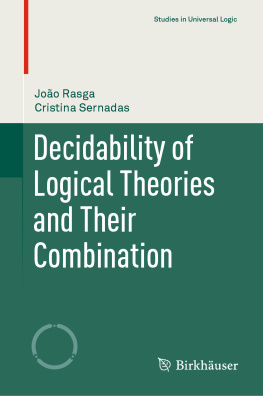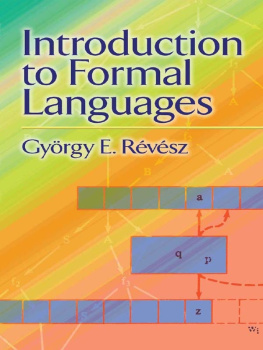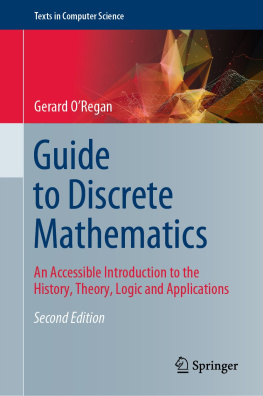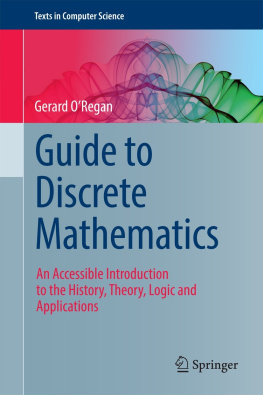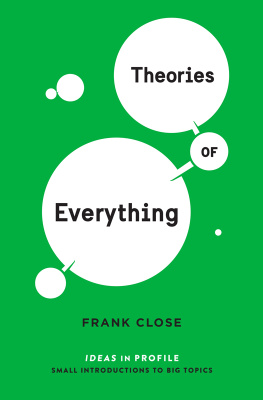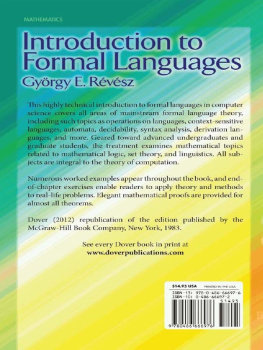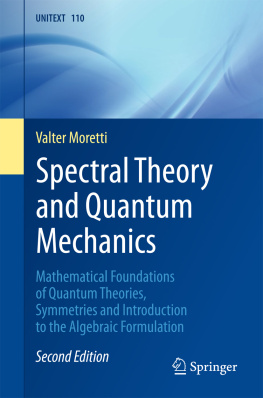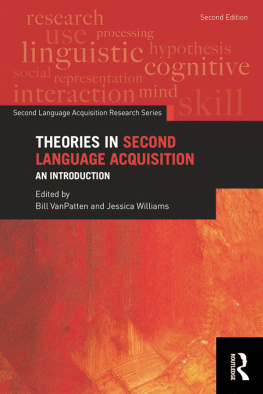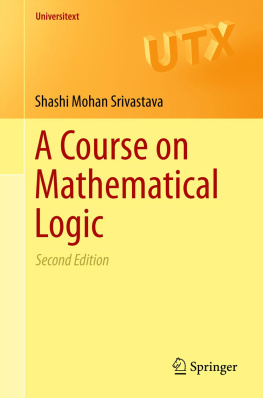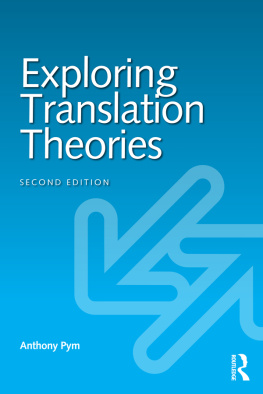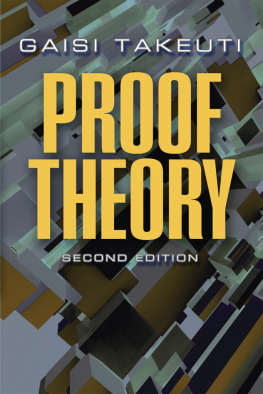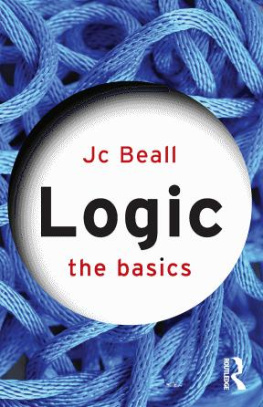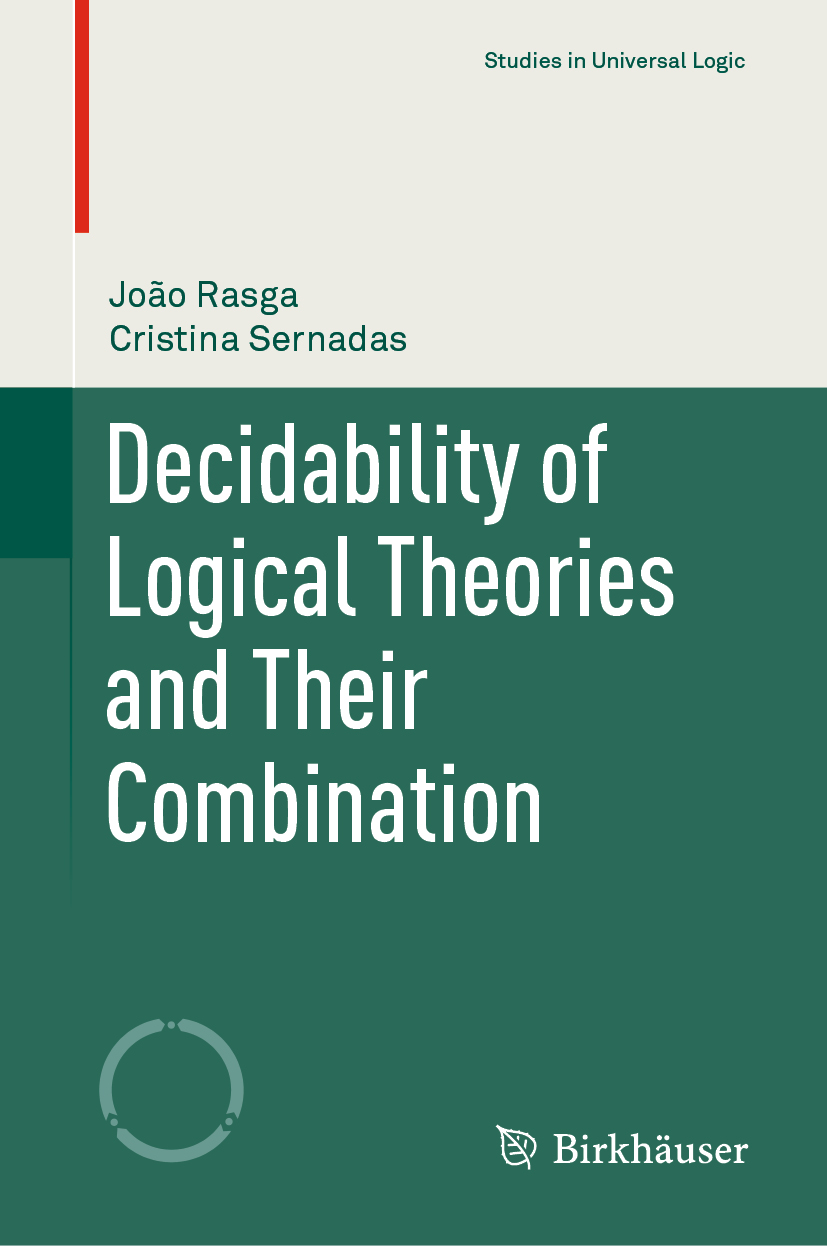Studies in Universal Logic
Series Editor
Jean-Yves Bziau
Federal University of Rio de Janeiro, Rio de Janeiro, Brazil
Editorial Board
Hajnal Andrka
Hungarian Academy of Sciences, Budapest, Hungary
Mark Burgin
University of California, Los Angeles, CA, USA
Rzvan Diaconescu
Romanian Academy, Bucharest, Romania
Andreas Herzig
University Paul Sabatier, Toulouse, France
Arnold Koslow
City University of New York, New York, USA
Jui-Lin Lee
National Formosa University, Huwei Township, Taiwan
Larissa Maksimova
Russian Academy of Sciences, Novosibirsk, Russia
Grzegorz Malinowski
University of Ldz, Ldz, Poland
Francesco Paoli
University of Cagliari, Cagliari, Italy
Darko Sarenac
Colorado State University, Fort Collins, USA
Peter Schrder-Heister
University of Tbingen, Tbingen, Germany
Vladimir Vasyukov
Russian Academy of Sciences, Moscow, Russia
This series is devoted to the universal approach to logic and the development of a general theory of logics. It covers topics such as global set-ups for fundamental theorems of logic and frameworks for the study of logics, in particular logical matrices, Kripke structures, combination of logics, categorical logic, abstract proof theory, consequence operators, and algebraic logic. It includes also books with historical and philosophical discussions about the nature and scope of logic. Three types of books will appear in the series: graduate textbooks, research monographs, and volumes with contributed papers. All works are peer-reviewed to meet the highest standards of scientific literature.
More information about this series at http://www.springer.com/series/7391
Joo Rasga
Department of Mathematics, Instituto Superior Tcnico, Universidade de Lisboa and Instituto de Telecomunicaes, Lisboa, Portugal
Cristina Sernadas
Department of Mathematics, Instituto Superior Tcnico, Universidade de Lisboa and Instituto de Telecomunicaes, Lisboa, Portugal
ISSN 2297-0282 e-ISSN 2297-0290
Studies in Universal Logic
ISBN 978-3-030-56553-4 e-ISBN 978-3-030-56554-1
https://doi.org/10.1007/978-3-030-56554-1
Mathematics Subject Classication (2010): 03B10 03B25 03B62
Springer Nature Switzerland AG 2020
This work is subject to copyright. All rights are reserved by the Publisher, whether the whole or part of the material is concerned, specifically the rights of translation, reprinting, reuse of illustrations, recitation, broadcasting, reproduction on microfilms or in any other physical way, and transmission or information storage and retrieval, electronic adaptation, computer software, or by similar or dissimilar methodology now known or hereafter developed.
The use of general descriptive names, registered names, trademarks, service marks, etc. in this publication does not imply, even in the absence of a specific statement, that such names are exempt from the relevant protective laws and regulations and therefore free for general use.
The publisher, the authors and the editors are safe to assume that the advice and information in this book are believed to be true and accurate at the date of publication. Neither the publisher nor the authors or the editors give a warranty, expressed or implied, with respect to the material contained herein or for any errors or omissions that may have been made. The publisher remains neutral with regard to jurisdictional claims in published maps and institutional affiliations.
This book is published under the imprint Birkhuser, www.birkhauser-science.com by the registered company Springer Nature Switzerland AG
The registered company address is: Gewerbestrasse 11, 6330 Cham, Switzerland
Preface
The main objective of the book is to provide a self-contained introduction to decidability of first-order theories to graduate students of Mathematics and is equally suitable for Computer Science and Philosophy students who are interested in gaining a deeper understanding of the subject. The book is also directed to researchers that intend to get acquainted with first-order theories and their combinations. The technical material is presented in a systematic and universal way and illustrated with plenty of examples and a range of proposed exercises.
The book is organized as follows. In Chap. addresses the contemporary topic of combination of theories with the aim of obtaining preservation results in a universal way. Namely, we discuss preservation of satisfiability and decidability when combining theories by the Nelson-Oppen technique (see [2427]). The theories only share equality and are stably infinite. The book ends with an Appendix presenting a modicum of computability theory (see [2830]). The Appendix follows closely [30], namely, adopting as the computational model an abstract high-level programming language. The concepts of computable function, decidable set and listable set are defined and explored. The problem reduction technique is also discussed.
References
E. Mendelson, Introduction to Mathematical Logic, 6th edn. (Chapman and Hall, 2015)
R. Cori, D. Lascar, Mathematical Logic, Part I, Propositional Calculus, Boolean Algebras, Predicate Calculus (Oxford University Press, 2000)
R. Cori, D. Lascar, Mathematical Logic, Part II, Recursion Theory, Gdel Theorems, Set Theory, Model Theory (Oxford University Press, 2001)
H.B. Enderton, A Mathematical Introduction to Logic, 2nd edn. (Academic Press, 2001)
A. Sernadas, C. Sernadas, Foundations of Logic and Theory of Computation, 2nd edn. (College Publications, 2012)
C.C. Chang, H.J. Keisler,. Model Theory (Dover, 2012)
W. Hodges, Model theory, in Encyclopedia of Mathematics and its Applications, vol. 42 (Cambridge University Press, 1993)
W. Hodges, A Shorter Model Theory (Cambridge University Press, 1997)
D. Marker, Model theory: an introduction, in Graduate Texts in Mathematics, vol. 217 (Springer, 2002)
G. Gentzen, The Collected Papers of Gerhard Gentzen, in. Studies in Logic and the Foundations of Mathematics, ed. by M.E. Szabo (North-Holland, 1969)
A.S. Troelstra, H. Schwichtenberg. Basic Proof Theory, vol. 43, 2nd edn. (Cambridge University Press, 2000)
J. Gallier, Logic for Computer Science: Foundations of Automatic Theorem Proving (Dover, 2015)
R.M. Smullyan, First-Order Logic (Springer, 1968)
W. Hodges, A Shorter Model Theory (Cambridge University Press, 1997)
J. Gallier, Logic for Computer Science: Foundations of Automatic Theorem Proving (Dover, 2015)
T. Skolem, Selected Works in Logic by Th. Skolem, ed. by J.E. Fenstad. Scandinavian University Books (Universitetsforlaget, 1970)
C. Ryll-Nardzewski, On the categoricity in power 

